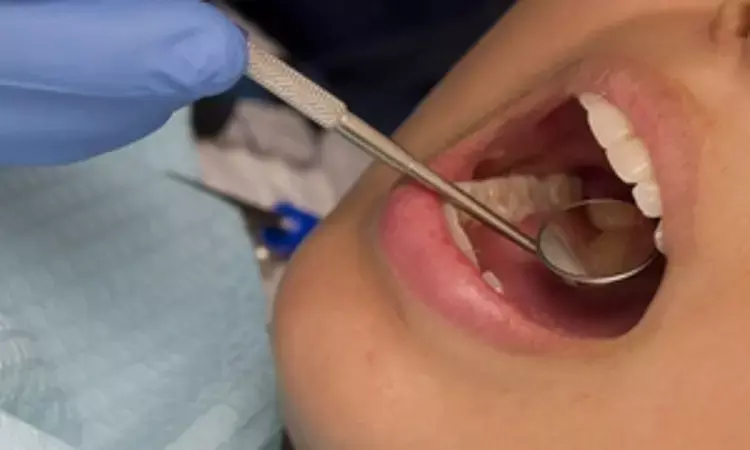- Home
- Medical news & Guidelines
- Anesthesiology
- Cardiology and CTVS
- Critical Care
- Dentistry
- Dermatology
- Diabetes and Endocrinology
- ENT
- Gastroenterology
- Medicine
- Nephrology
- Neurology
- Obstretics-Gynaecology
- Oncology
- Ophthalmology
- Orthopaedics
- Pediatrics-Neonatology
- Psychiatry
- Pulmonology
- Radiology
- Surgery
- Urology
- Laboratory Medicine
- Diet
- Nursing
- Paramedical
- Physiotherapy
- Health news
- Fact Check
- Bone Health Fact Check
- Brain Health Fact Check
- Cancer Related Fact Check
- Child Care Fact Check
- Dental and oral health fact check
- Diabetes and metabolic health fact check
- Diet and Nutrition Fact Check
- Eye and ENT Care Fact Check
- Fitness fact check
- Gut health fact check
- Heart health fact check
- Kidney health fact check
- Medical education fact check
- Men's health fact check
- Respiratory fact check
- Skin and hair care fact check
- Vaccine and Immunization fact check
- Women's health fact check
- AYUSH
- State News
- Andaman and Nicobar Islands
- Andhra Pradesh
- Arunachal Pradesh
- Assam
- Bihar
- Chandigarh
- Chattisgarh
- Dadra and Nagar Haveli
- Daman and Diu
- Delhi
- Goa
- Gujarat
- Haryana
- Himachal Pradesh
- Jammu & Kashmir
- Jharkhand
- Karnataka
- Kerala
- Ladakh
- Lakshadweep
- Madhya Pradesh
- Maharashtra
- Manipur
- Meghalaya
- Mizoram
- Nagaland
- Odisha
- Puducherry
- Punjab
- Rajasthan
- Sikkim
- Tamil Nadu
- Telangana
- Tripura
- Uttar Pradesh
- Uttrakhand
- West Bengal
- Medical Education
- Industry
Gum disease and tooth loss linked to brain shrinkage

In one of the recent publications of the AMERICAN ACADEMY OF NEUROLOGY, researchers have said that good oral health can play an important role in keeping the brain healthy.
A detailed explanation of this study is published in Neurology. According to this study, gum disease and tooth loss lead to brain shrinkage in the hippocampus. This plays a crucial role in memory and Alzheimer’s disease explaining not the cause but the association.
We know that gum inflammation causes tooth loss and gum shrinkage. There needs to be data evaluating a potential link between oral health. In this study, we found that these conditions are related to brain health, especially the areas responsible for thinking and memory. For this reason, it is imperative to maintain good oral hygiene, they mentioned.
Researchers included 172 people with a mean age of 67 who did not have memory problems. At the beginning of the study, dental exams and memory tests were conducted. In the dental exam, teeth were counted and periodontal probing depth was recorded to check the status of gingival diseases. A probing depth of 1-3 mm is considered to be the normal range. A probing depth of 3-4mm indicated mild gum disease while 4-6 mm measured severe gum disease. In severe gingival diseases due to bone loss, teeth become mobile and fall out.
The key study points are:
- The degree of gum diseases and teeth number were related to changes in the left hippocampus of the brain.
- Those with mild gum disease and fewer teeth had a faster rate of brain shrinkage in the left hippocampus.
- Those with severe gingival diseases and more teeth had faster brain shrinkage in the same area of the brain.
- one less tooth was equivalent to nearly one year of brain ageing in mild conditions.
- one more tooth was equivalent to 1.3 years of brain ageing in those with severe gum disease.
The study has highlighted an important consideration of teeth preservation.
They said, “In our study, we found that retaining teeth with severe gum disease is associated with brain atrophy. “
Japanese Ministry of Education supported the study.
BDS, MDS in Periodontics and Implantology
Dr. Aditi Yadav is a BDS, MDS in Periodontics and Implantology. She has a clinical experience of 5 years as a laser dental surgeon. She also has a Diploma in clinical research and pharmacovigilance and is a Certified data scientist. She is currently working as a content developer in e-health services. Dr. Yadav has a keen interest in Medical Journalism and is actively involved in Medical Research writing.
Dr Kamal Kant Kohli-MBBS, DTCD- a chest specialist with more than 30 years of practice and a flair for writing clinical articles, Dr Kamal Kant Kohli joined Medical Dialogues as a Chief Editor of Medical News. Besides writing articles, as an editor, he proofreads and verifies all the medical content published on Medical Dialogues including those coming from journals, studies,medical conferences,guidelines etc. Email: drkohli@medicaldialogues.in. Contact no. 011-43720751


